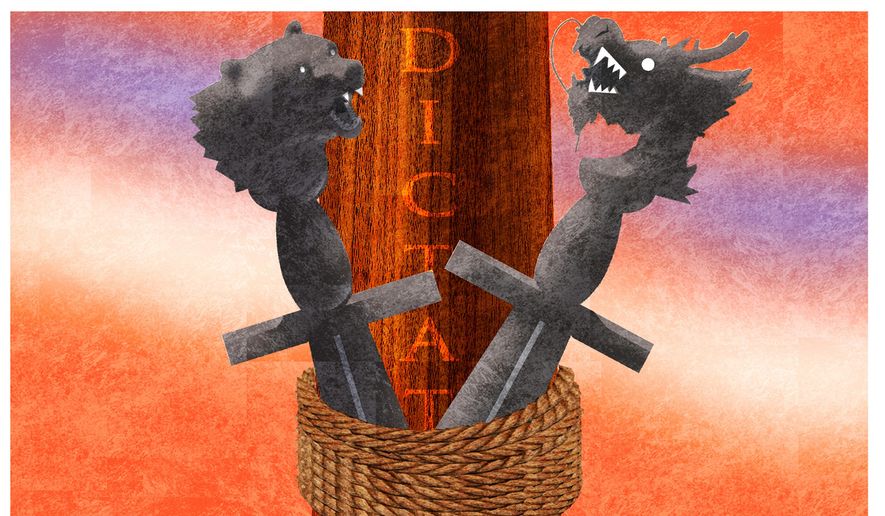OPINION:
In some quarters of the professional foreign policy establishment, a notion is taking hold that a rising China is destined to become the world’s dominant power and that the best hope for America is to “manage national decline.”
This view is heartily endorsed by Chinese President Xi Jinping. In a 2021 speech celebrating the centennial of the Chinese Communist Party, Mr. Xi boasted of how the party had “transformed the future of the Chinese people and nation.” Now, “China’s national rejuvenation has become a historical inevitability,” he said.
For all of Mr. Xi’s chest-thumping, however, China is not invincible, nor is its path to dominance preordained. Mr. Xi might be on the verge of making a strategic mistake that could cost him his dictatorship, and that path to self-destruction goes right through the Kremlin.
Mr. Xi has two choices: Let Vladimir Putin fall or prop him up and risk an economic war with the West that China cannot win. Neither choice is palatable, and the budding disaster is of his own making. He tied himself to the dictator’s mast alongside Mr. Putin, declaring a “limitless friendship, a relationship that cannot be compared with anything in the world” in the weeks leading up to Russia’s invasion of Ukraine. Mr. Xi also pledged his regime — already reeling from COVID-19 and Western technology sanctions — to economic and political war with the U.S. and the West over Mr. Putin’s megalomania.
But Mr. Xi cannot win an economic war with the Organization for Economic Cooperation and Development, no matter how much globalization has tied the world economy together.
As Mr. Putin suffered devastating losses on the battlefield, Mr. Xi picked the anniversary of the invasion to stand with his vassal partner. He fears the fall of Mr. Putin’s gangster state and the emergence, still a long shot given Russian history, of a pro-European government in Moscow — an event that by itself would end Mr. Xi’s plans to rewrite the global playbook by destroying the American-centered democratic and rules-based order.
Rescuing Russia commits Beijing to, according to the Daily Telegraph’s Ambrose Evans Pritchard, “a vast open-ended commitment along the lines of FDR’s Lend-Lease for Britain … and guarantees a world historical confrontation with the democracies and the international economic system.”
Secretary of State Antony Blinken announced that Mr. Xi is preparing to open the military and economic spigots. It may be part of a diplomatic ruse to persuade the weaker players in the anti-Putin coalition — Germany, France and Italy — to urge peace talks before Mr. Putin suffers more defeats on the battlefield. Yet it is still a dangerous play.
The CCP after Mao has always been cautious. Many within its leadership see the partnership with Mr. Putin as hurting China’s image and risking Beijing’s future economic development. Under Mr. Xi, the economic revolution wrought by Deng Xiaoping is over, replaced by the rebirth of massive, inefficient state economic enterprises.
Mr. Xi has misjudged the power of the West and put China on the wrong end of high-tech economic sanctions that China has no internal means of overcoming. The combined navies and merchant services of the West still control the energy and mineral shipping lanes that China must use to survive. Through his questionable decisions, he has awakened a slumbering Japanese military giant and forced the Philippines and other more passive neighbors to seek the protection of a U.S.-led alliance.
The hard men in the Forbidden City know their communist history and remember what happened when Nikita Khrushchev’s adventurism forced his ouster by Leonid Brezhnev in 1964. I suspect that many of them are studying up on that lesson and understand that if the Putin dalliance fails, Mr. Xi might be its greatest casualty.
• Robert Wilkie served in the Trump administration as the 10th secretary of veterans affairs and as undersecretary of defense for personnel and readiness. He currently serves as distinguished fellow at the Center for American Security at the America First Policy Institute.




Please read our comment policy before commenting.